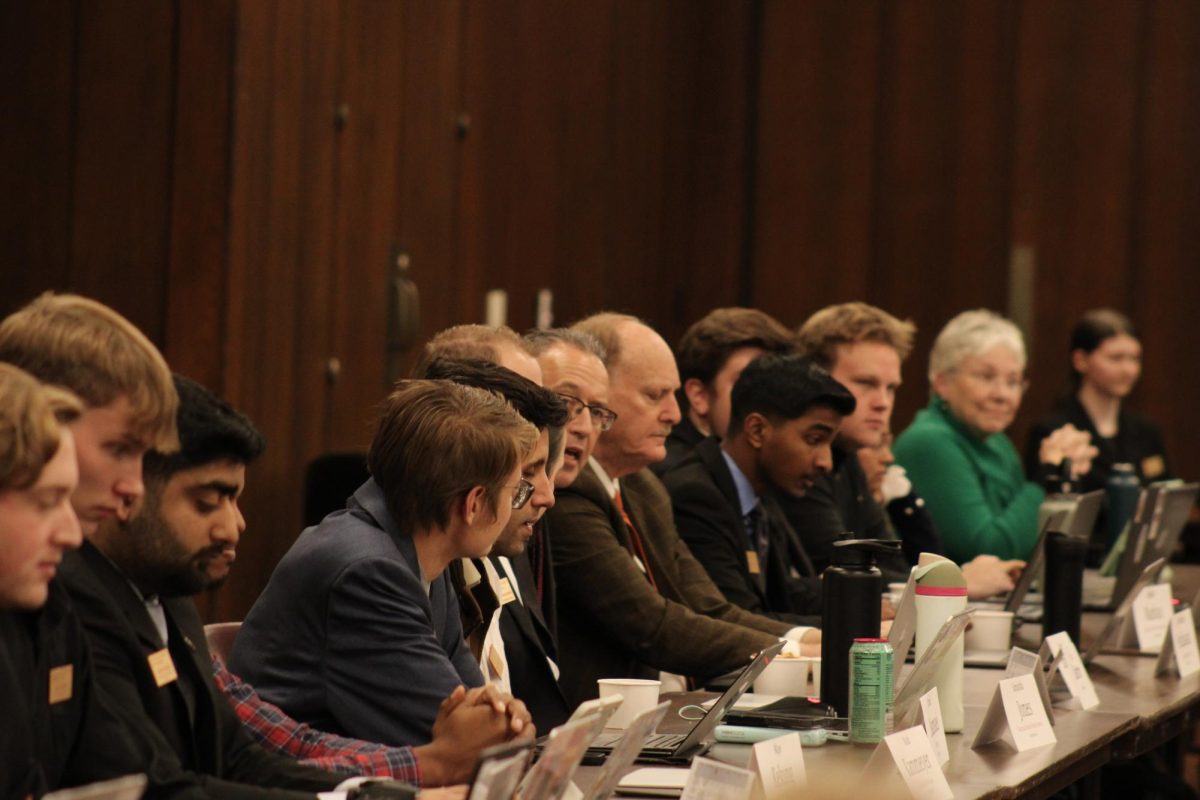COLUMN:Mourning our dearly departed economic reform
December 11, 2002
If there’s one thing that can be said about the Bush administration, it’s that loyalty is valued above all else — including principles.
Such was the case last Thursday when Treasury Secretary Paul O’Neill was cordially asked to clear out his desk and be out by Monday as part of Bush’s largely symbolic reshuffling of his economic team.
It’s no question that O’Neill was the black sheep of the administration — when he wasn’t on world tour debating foreign aid policies with U2 lead singer and activist Bono, oftentimes he could be seen on the weekend political talk show circuit making the Bush administration officials cringe and summarily retract O’Neill’s statements Monday morning.
Thus, Mr. O’Neill’s sacking comes as little surprise to anyone who has paid attention to how the Bush policy machine works — dissent is not an option.
Pundits are calling Secretary O’Neill’s firing (along with that of economic adviser Lawrence Lindsey) as a signal of change on domestic issues — namely the economy, where Bush has been hammered by Democrats for failing to present a coherent or substantive economic strategy aside from copious amounts of cheerleading and myriad tax cuts phased in over a decade. They’re right that his departure is largely symbolic — but for far different reasons than a failure on Mr. O’Neill’s part to do his job well.
Rather, O’Neill represented that nagging persona of Jiminy Cricket, the external conscience of the administration who would frequently remind Bush of his avowed conservative economic principles — from free markets to fiscal discipline. But alas, much like Pinnochio’s arthropod counterpart, O’Neill’s admonitions were frequently brushed aside, usually leading to trouble.
When it came to steel tariffs, it was O’Neill who spoke out against their efficacy to solve problems in the steel industry, despite Bush’s desire to score quick political points within the Rust Belt.
When it came to economic stimulus, O’Neill was the only one in the room who seemed to recall Bush’s proclaimed ideals of fiscal discipline and balanced budgets before surging ahead with both ballooning deficits due to unforeseen expenses caused by the war on terror and Bush’s proposed expansion of tax cuts.
In fact, when it came to Bush’s economic policy, O’Neill was perhaps the most principled and ardent champion of reform, especially when it came to the tax system, which O’Neill called an “abomination” due to its arcane and complex nature.
Could Bush have been troubled to use his political capital towards the more productive end of tax reform rather than a legion of tax cuts which only further snarl the already labyrinthine tax system? The issues of providing meaningful tax relief to American families while maintaining fiscal discipline might not have seemed so at odds.
O’Neill was of course not without his detractors — the most frequent charge was that he was a “loose cannon” who had a habit of giving Wall Street types the jitters, often due to his brutal honesty and independent streak. Yet this is what the American people should expect from competent officials — a free thinker who isn’t afraid to speak their mind and be upfront about relevant issues. The last thing the economy needs is yet another cheerleader —ÿa role Mr. O’Neill was eventually forced into during his final days.
The saddest part about O’Neill’s departure is in that it represents the final nail in the coffin for all hope of principled reform on economic issues.
Bush’s new nominee, John W. Snow, can be expected to be both a loyalist to the Bush economic line, which thus so far has simply amounted to a mishmash of sops to various well-connected industries, from oil and gas to agriculture to steel.
If anyone has been taken for a ride by the Bush administration, it has been free-market ideologues who threw their support in with Bush to begin with — yet as Mr. O’Neill’s firing shows, these conservatives will likely take these lumps and more, smiling all the way to 2004 to avert the catastrophe of the White House changing hands — as if this would make any difference in the nation’s economic policy.
Ultimately, however, what Bush’s economic policy represents is a fundamental split between the libertarian economic ideology of fiscal discipline, free markets and free trade embraced by Libertarians along with more libertine Republicans like outgoing Sen. Dick Armey (R-TX), versus the corporate-state mentality of subsidies, tariffs and cronyism that have prevailed whenever convenient in Bush’s policy-making.
Until free-market conservatives wise up to this dichotomy, to couple the terms “laissez-faire” and “Republican” will soon become a misnomer. If advocates of free markets ever expect their arguments to be taken seriously in the intellectual domain, it is imperative that they take back the mantle of economic “conservativism” stolen by Bush.
Otherwise, Mr. O’Neill will simply be another nail in the coffin.
Steve Skutnik
is a graduate student
in nuclear physics from Ames.






